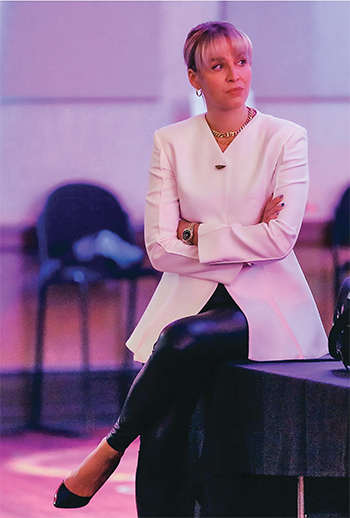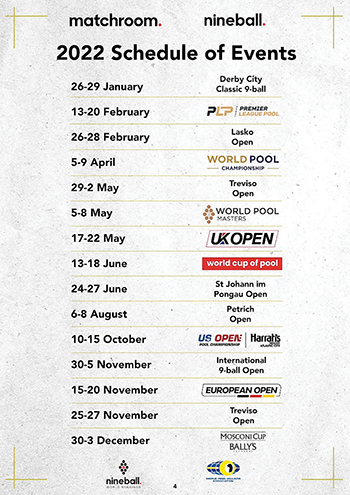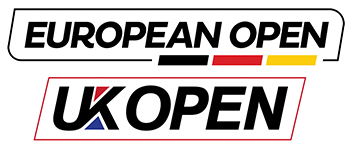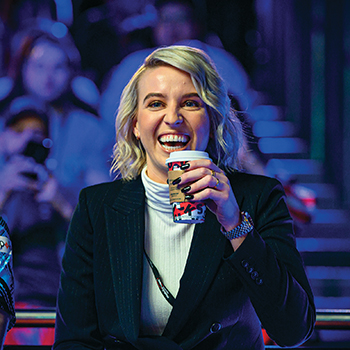In unveiling its Nineball World Ranking and Matchroom Nineball Schedule, the British promoter has taken on the challenge of creating a global tour for the discipline. What happens next?
With the announcement that mega-promoter Matchroom is setting up the structure for a world 9-ball ranking tour going forward (see Wing Shots, page 12), the pool world has responded with renewed optimism about the game’s future. While nations continue to struggle with the challenges of a worldwide pandemic, Matchroom is charging ahead with an ambitious plan to build a tournament structure that could finally provide players the opportunity to earn a living and fans a glut of events and programming to consume. On the heels of the announcement, Billiards Digest caught up with Matchroom Multi Sport Managing Director Emily Frazer to dig a little deeper into the 2022 Matchroom Nineball Schedule and the new Nineball World Rankings.
It was interesting to see Barry Hearn at the forefront of the 9-ball rankings announcement. Has he been more involved in recent planning?
Now that Barry has massively taken a step back from operations, his mind’s opened up a little more with pool. He’s more receptive to new ideas. When we meet now the discussions are about what can we do with pool and how can we improve it. It’s more brainstorming. He trusts my judgments with pool, but I also recognize that he set up the darts. He set up the snooker. He put the ranking systems and all that into place. He knows much more about how to make that work than I ever will. When I go away and work on my ideas and we meet up again, he says, “Well, have you thought out this?” and “This happened in this sport.” He has that experience. So, we worked on this together. And you can’t deny that when Barry gets on camera and makes a statement or announces something, the impact is incredible. After doing this in snooker and darts, I think he wants his legacy to be that he built this with pool, too. Working with him this way has been really cool. I’ve learned loads.
How will the new rankings affect your events? Will anything change?
Possibly. For example, we’ve always seeded the defending champion No. 1. Will that stay or change? We don’t want to make a decision without thinking it through. We’ll look at other sports. Same with the World Cup of Pool. What happens if Albin Ouschan and Mario He are defending champions, but Max Lechner is ranked higher than one of them in the rankings?
What was behind the decision to make rankings money-based instead of points-based?
When we looked at the prize money for ranking points, we looked at snooker and darts and we feel it works there. Then we looked at how the points structure really didn’t work for Team Europe and the Mosconi Cup. So, we took that information into consideration. We know the added money ranges from almost zero to more than $100,000, so we looked at total prize money. I hope that in two years we can come up with a minimum to eliminate events that shouldn’t be part of the ranking process. Now, when a promoter comes to us and says, “We’d like to do a ranking event,” we can say, “Okay, here are our basic list of requirements. Please send us your full format, added money and prize distribution structure.” If it is out of whack and all of the prize money is loaded to the top, we can deny the event unless they change it. We don’t want to approve an event, have our stamp all over it and then get calls from players saying the structure is unfair. We’ll have contracts in place to prevent that.
The current 2021 schedule includes five Euro Tour events and two U.S. events, but the U.S. events have four or five times the prize money. Would you allow a second U.S. event to run at the same time as the Euro Tour events?
Not in year one because the calendar is free enough to add events. At the moment, we’re not taking on additional European events until we get more U.S. events on the schedule. Ideally, you want promoters to look at the U.S. events on the calendar and schedule in right ahead or behind those events. The same with European events. So, for players who come to Europe, or for European players who travel to the U.S., there are two or three events in a row to compete in. The Euro Tour is concerned about clashing dates with U.S tournaments, of course. But what I told them is that in three to five years, we hope the calendar is full enough where there are some clashes, and the players will pick and choose. But, by then, the prize money will have minimums and the tournaments that don’t stack up will be winnowed out.
Can the calendar ever be truly set a year in advance? Your events are dictated in large part by TV and venues.
We’ve already had an issue with the Premier Pool League because the venue took on an event that they couldn’t turn down, forcing us to change the start date, and that day won’t work. So now we have to find another venue and I can’t clash with existing events.
How long did it take before you realized you’ve become the defacto tournament schedule coordinator for the world?
The minute one of the promoters came back and said, “This won’t work because of this or that.” But I told Barry before all this that we’re going to have to be prepared to put in a load of work on this. I’m trying to set up our team structure so that pool is properly looked after. At the same time, we’ve got to maintain the level of what we’re doing with other sports in the Multi Sport portfolio.
People have commented about a “season,” but this is really a 12-month commitment for players. Do you see a point at which there is a season, with part if the season in the U.S., and part in Europe?
It would be silly for us not to look at what’s worked well in darts and snooker. The snooker calendar now is stacked. It should be a season. And does that lead up to the Mosconi Cup? Or to the World Championship, like darts and snooker? One of the initial thoughts is to have a month after Mosconi or the World Championship be the “off season.” At the moment, it’s so unstructured. I think we need to run with it and let it work itself out. I’m already starting my Matchroom calendar for 2023, and I would see Euro Tour and U.S. promoters looking at the calendar and finding those open slots before or after the Matchroom events; Euro Tour events tied to the Matchroom events in Europe and U.S. events tied to the Matchroom events in the U.S. That’s how it should happen going forward.
How long will it take to establish uniformity in formats and rules throughout the 9-ball ranking events?
I made a list of things that we want to see standardized, because the rules and formats are all over the place right now. After speaking to various promoters, I made another list of things that I think actually could change. I’ve learned a lot. For instance, us eliminating the three-point rule isn’t an easy thing for some promoters, given their current structure. We have rackers and players aren’t allowed to inspect the rack. Not all promoters can do that, so players rack. And if players rack, you have to allow the other player to inspect the rack. And to prevent further problems, you have to institute a three-point rule. So, I understand that not all event promoters can adopt this in 2022. We’ll be flexible. As for 1 or 9 on the spot, I don’t really care which it is. I just want it to be competitive, and then consistent in all events. We’ll determine after this year what the rule will be. We want to get to a point where there is agreement, “These are the most competitive racking and breaking rules,” and adopt that going forward. I think a racker at each table is something that will be required going forward. I mean, even as a casual sports fan, if I tuned into an event and saw the players setting up the field of play, I’d think, “This is a bit dodgy.”
Barry was always insistent on calling the events “Pool Championships” instead of “9-Ball Championships.” Now you’ve made a complete shift in branding. How did that decision come about?
That was a fight that I lost, but I’ve come around. As we acquired the World Championship and U.S. Open, we’ve tried to establish our name or identity as a brand. But when I’d sit with broadcasters and potential sponsors and we’d say, “This is a world championship pool event,” they don’t always know what that means. Does it mean swimming, or what? So, a year or so ago I decided we need to get into everyone’s head that “pool” is 9-ball. That’s why we changed the names to World Pool Championship and U.S. Open Pool Championship. At the beginning of the ranking discussion, we set it up as the Pool Tour. But people look at pool and they don’t know straight away that there is more than one form of the game. So, Barry took the side of, “Well, if we push 9-ball, everyone knows it’s 9-ball, when it’s universally recognized we can switch to “pool.” I said, “Fair enough.” So, that’s how we established this “nineball” branding. The full word lettering is better suited to the Matchroom branding than using the number 9. There’s consistency there. I think we both wanted the same thing in the end.
So, will the World Championship and U.S. Open now switch back to 9-ball as a title?
I don’t know. I think we’ll keep it as is for a little while. These are our Matchroom events, and we want consistency there, too. I don’t think that changing the others to the World Cup of 9-Ball or the World 9-Ball Masters works very well. So, our events will all be titled “Pool” for the time being.
What does the future of the WPA look like relative to the future of the Matchroom 9-ball tour?
We certainly don’t want to be involved with federations and player standings, etc. Also, in creating transparency for things like the invitational events and Mosconi Cup, there needs to be that independent structure overseeing things. We hope that as this grows, and in three years’ time we’ve doubled the calendar and doubled the prize money, the WPA will grow stronger as well through sanctioning. We want to make sure going forward that there are press releases on their web site and more social media activity. To do all that we have to work together. I’ve set up the right communications between my team and the WPA’s team to ensure that things like that are actually going to happen moving forward.
Do you see Matchroom playing a role in the restructuring of the WPA to the point that it has the capabilities and funding and staff to do all those things, like you did with World Snooker and the WPBSA?
The sport needs the WPA. I don’t know if we want to be part of a restructuring. But anything that would help the game evolve, we would want to be involved within that change. We don’t want to be the governing body, but we want to help ensure that there is a good governing body in place. The good thing about our events now, like the World Pool Masters and the World Cup of Pool, is that they are set up with entry requirements, so we’ve now given the WPA allocations for the spots. They share those with the member federations. Now, all of a sudden, that gives more structure for everyone instead of us just handing out invitations and having players worry about how people are selected. I don’t really know where it’s all going to go. Right now, we’re just staying in communication and seeing what can be done. We’re just starting to implement this structure in our events and rankings now, so to get involved in some kind of restructuring of the WPA would be getting ahead of ourselves. The movement of the sport will naturally help or force the WPA to restructure to be more effective and keep up with the sport.
Will promoters that want to hitch their events onto the ranking bandwagon be required to be WPA sanctioned?
Yes, as of 2023. It’s too last-minute to enforce that in 2022. There are still so many unknowns, so we didn’t want to set up too many hurdles for the promoters. And Ian [Anderson] and the WPA understood that.
It already seems like the fight to be a part of this is going to get crazy sooner than later. It’s almost been a blessing that part of the world is out of consideration right now because it allows you to take baby steps establishing the tour with just the U.S. and Europe. But at what point does Asia become part of the calendar and the discussion in terms of ranking events?
It has made things a little easier at the start. As for Asia, it’s really just knowing when we can even go over there. As soon as I know when we can go over there, we’ll start scheduling time for them. They’re on our radar, but there is still far too much uncertainty. Even Australia and New Zealand have reached out about doing back-to-back events, but we can’t even start discussions until they are able to have an event and players are allowed to travel there.
How do you protect the top Asian players who are in jeopardy of falling too far behind in your rankings because they can’t get to events?
It’s something we’re working on. Already Ko Pin Chung has said he can’t attend our first event because he’s only had one dose of vaccination. In World Snooker, there is a one-year list to take into account rankings for players who can’t participate. It might be something we use to protect top Asian players from getting totally phased out because of the 2022 rankings.
What spurred you to take on this daunting challenge?
It was apparent that it needed to happen and no one else was going to do it. In order for this to work, it has to be on TV. We can’t produce the entire year. So, for this to move forward, we have to bring in other promoters and we have to start working together. A lot of the discussions about working together have come from promoters like Chad Sharlow, who we’ve worked with to develop a big amateur event with our pro events. Why should we just sit in our own lane and do things to help ourselves when we can work with everyone else and get this all to grow much bigger and faster.
As all of these disparate events join the ranking tour, how does Matchroom handle the broadcast issues?
One of the points that we listed when determining the benefits to promoters was production. And this may be three years down the road, but we could say, “Look, we’ll pay for the production, but we take the rest of the world rights, and you take the host rights,” or “You set up production to these specs and we take certain broadcast rights and pay a fee.” Either way, the promoter is getting some type of income from the broadcast, but we help distribute. But that’s down the pipeline. Some promoters are simply going to have to step up their production. I was really impressed with what Pat Fleming did with scoring at last year’s International Open. That’s going to force other promoters to step up. At some point, I would like to set up our own production office in the U.S. What’s currently stopping us from taking some of our events there is the cost. That would make it much more affordable for us to bring, say, Premier League Pool, to the U.S.
Given the scope of what you’re launching, is the pool portion of Multi Sport going to become a full-time job?
This has been on my mind since we started putting this in place. I have to make sure all of our events deliver to Mosconi Cup standards. I’ve been working more on possibly having a dedicated pool department within Multi Sport. I can’t expect everyone to work the hours I do. I will have to see how things progress this year. I can’t neglect the other sports and events. But we want to keep growing the pool calendar, so it’s going to demand more and more time.




